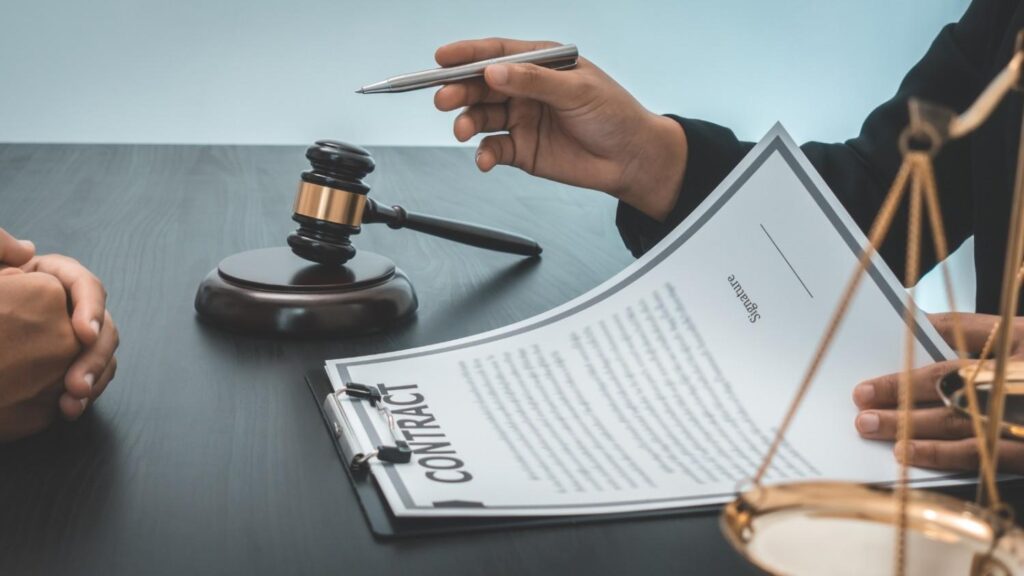
Lawsuits can feel overwhelming. The stress of mounting legal fees, endless paperwork, and the uncertainty of a courtroom decision can take a toll on anyone involved. On top of that, the time and emotional energy required to resolve a legal dispute can leave both individuals and businesses drained. Fortunately, there’s a way to avoid the unpredictable nature of a trial: Settlements. By understanding the settlement negotiation process, you can take control of your case and work toward a resolution that meets your needs.
In this guide, we’ll cover everything you need to know about navigating settlement negotiations during a lawsuit. Whether you’re seeking financial relief or hoping to protect your business interests, we’ll learn how settlement can make a difference and how the role of a trusted business dispute attorney and key strategies can help you further.
Let’s explore how settlements work and why they’re often the preferred solution for resolving legal disputes.
Understanding Settlements After a Lawsuit and Why They Are Important
A settlement is an agreement reached between two parties to resolve a lawsuit without going to trial. Instead of leaving the outcome to a judge or jury, both sides negotiate terms that work for them. Settlements can involve monetary compensation, changes in business practices, or other mutually acceptable resolutions. This approach often provides more certainty and control than a courtroom verdict.
Settlements are important for several reasons:
- Time-Saving: Settlements resolve disputes faster than lengthy court battles.
- Cost-Effective: Avoiding trial means significantly lower legal fees and other expenses.
- Reduced Stress: Negotiating a settlement is less adversarial than fighting in court.
- Confidentiality: Settlement terms can remain private, protecting sensitive information.
Understanding the significance of settlements can help you approach the negotiation process with confidence and focus on achieving a resolution that aligns with your goals.
How Settlements Are Negotiated After a Lawsuit Begins
Settling a lawsuit involves strategic discussions, thorough preparation, and often some compromise. Understanding the key steps and methods used during negotiations can empower you to approach the process with confidence and clarity.
Initial Steps Attorneys Take to Initiate Settlement Talks
The first step in any settlement negotiation is case evaluation. Attorneys assess the strengths and weaknesses of their client’s case by reviewing evidence, legal precedents, and potential risks of proceeding to trial. This assessment helps them determine a realistic starting point for negotiations, ensuring their client’s expectations are aligned with possible outcomes.
Once the case is evaluated, attorneys initiate discussions. For plaintiffs, this often begins with a demand letter—a formal document outlining the damages sought and the reasoning behind the claim. For defendants, this might involve crafting a counteroffer or responding to the initial demand.
At this stage, the focus is on opening dialogue and establishing a foundation for productive negotiations. Clear communication and strategic framing of the issues are crucial in setting the tone for the discussions that follow.
The Role of Mediation and Arbitration in Settlement Discussions
Mediation and arbitration are two common methods of alternative dispute resolution that play a pivotal role in many settlements. Both involve third-party professionals who help facilitate an agreement between the disputing parties, though their approaches differ significantly.
Mediation is collaborative. A neutral mediator works with both parties to identify common ground and guide discussions toward a mutually agreeable solution. Mediation doesn’t result in a binding decision from the mediator but creates an environment for productive negotiation. The result of successful mediation is generally a written settlement agreement that resolves the dispute.
Arbitration, on the other hand, involves a neutral arbitrator who hears both sides of the dispute and makes a binding decision on the parties regardless of whether the Parties agree with the result. While arbitration is less flexible than mediation, it offers a quicker and sometimes more cost-effective resolution than a trial. Both methods reduce the adversarial nature of lawsuits, making them valuable tools for reaching settlements.
Key Strategies Used by Both Parties During Negotiations
Effective negotiation is both an art and a science. Attorneys use a mix of tactics to secure favorable outcomes for their clients while avoiding the unpredictability of a trial. For plaintiffs, this often means presenting a strong case supported by clear evidence and compelling arguments. Defendants, meanwhile, focus on identifying weaknesses in the plaintiff’s case to leverage more favorable terms.
Flexibility and creative problem-solving are also key. Settlements aren’t just about monetary compensation—they can include other terms, such as confidentiality clauses, service modifications, or future commitments.
By understanding the opposing party’s priorities, attorneys can craft offers and counteroffers that appeal to both sides. This collaborative approach often leads to quicker and more satisfactory resolutions.
Factors That Can Speed Up or Delay Settlement Agreements
Several factors influence how quickly a settlement can be reached. When both parties are motivated to avoid trial, negotiations typically progress more smoothly. A willingness to compromise and the presence of strong evidence can also expedite the process, as both sides have clarity about the likely outcome if the case were to proceed in court.
Delays often result from unrealistic demands, poorly prepared documentation, or a lack of communication. Personal conflicts or emotional stakes can also complicate discussions, making it harder to find common ground.
To navigate these challenges, it’s essential to work with a comprehensive business contract attorney who can manage the legal intricacies while clearly focusing on achieving a fair resolution. Their knowledge ensures that negotiations remain efficient and productive, reducing unnecessary delays.
Best Practices for Ensuring an Advantageous Settlement
Securing a favorable settlement requires preparation, strategy, and clear communication. Following best practices ensures you approach negotiations confidently and achieve terms that align with your goals.
Preparing Strong Evidence and Documentation
Thorough evidence and documentation lay the foundation for any strong settlement position. Plaintiffs need to provide clear proof of damages or wrongdoing, while defendants must demonstrate their defenses or mitigating factors. This includes compiling contracts, emails, invoices, and other critical records that support your case’s narrative. The stronger and more organized your documentation, the more leverage you have during negotiations.
Presenting evidence effectively requires careful analysis and attention to detail. Your attorney will use this information to build a compelling argument that highlights your case’s strengths. This preparation not only strengthens your position but also signals to the opposing party that you’re serious about reaching a fair and informed resolution.
Setting Realistic Expectations for Outcomes
Unrealistic expectations can derail even the most promising settlement discussions. Many parties enter negotiations with high hopes, but it’s important to understand the strengths and weaknesses of your case. Your attorney will help you assess the potential outcomes, including the best- and worst-case scenarios, based on legal precedent, evidence, and the dynamics of the opposing party.
This clarity allows you to focus on what truly matters in negotiations. Instead of holding out for an unattainable settlement, you’ll be prepared to find solutions that address your core priorities while remaining realistic. This mindset helps you approach the process constructively, minimizing frustration and wasted time.
Understanding the Costs and Risks of Going to Trial
A trial might seem like a path to vindication, but it comes with significant risks and expenses. Financially, trials often result in higher attorney fees, court costs, and witness expenses. The time commitment can also disrupt your personal life or business operations, prolonging stress and uncertainty.
Even with a strong case, trial outcomes are unpredictable. Judges and juries may interpret evidence differently, and there’s no guarantee of success. By weighing these factors, you’ll recognize the value of settling, especially when a reasonable agreement can be reached without enduring the costs and risks of litigation.
Maintaining Open and Professional Communication During Negotiations
Professional communication is a cornerstone of productive settlement discussions. Clear, respectful dialogue fosters understanding and reduces unnecessary tension between parties. Whether you respond promptly to offers or articulate your concerns, your tone and approach can significantly impact the negotiation’s outcome.
Working with a skilled business litigation attorney ensures your communications are handled effectively. They’ll frame your arguments professionally while avoiding missteps that could escalate conflicts. Maintaining this balance not only speeds up negotiations but also increases the likelihood of reaching a mutually acceptable agreement.
Choosing the Best Business Attorney for Your Case
Selecting the right attorney can significantly impact the outcome of your settlement negotiations. A reliable business attorney not only brings legal knowledge but also understands the nuances of your specific industry and case. Their ability to navigate complex negotiations while advocating for your interests ensures you’re in the strongest possible position.
When choosing the best attorney for your case, consider the following factors:
- Experience: Look for an attorney with a proven track record in similar cases.
- Tailored Knowledge: Ensure they are well-versed in business law and have handled disputes like yours.
- Communication: Choose someone who communicates clearly and keeps you informed at every stage.
- Reputation: Check reviews or ask for references to evaluate their reliability and professionalism.
- Availability: Ensure they have the time and resources to give your case the attention it deserves.
A reliable business attorney will combine legal acumen with practical problem-solving skills, helping you achieve a fair and advantageous settlement while minimizing stress.
Wrapping it Up
Settlements offer a practical, efficient way to resolve legal disputes without the risks and expenses of a trial. By understanding the negotiation process, preparing thoroughly, and working with a skilled attorney, you can achieve a resolution that aligns with your priorities. The key is to approach each step with clarity, professionalism, and a willingness to find common ground.
Whether you’re navigating settlement discussions or selecting a reliable business attorney, every decision you make impacts the outcome. By following the insights shared in this guide, you’re better equipped to handle your case with confidence and secure the best possible resolution.



